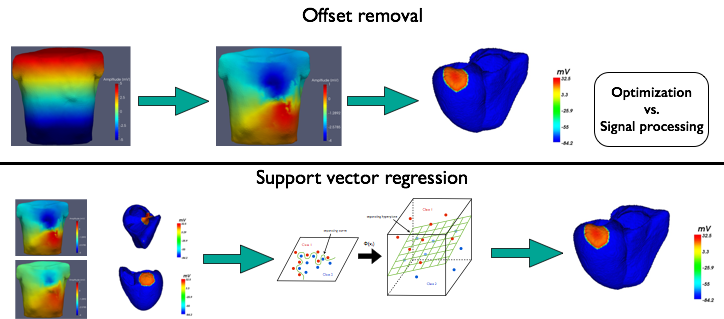ECG offset pattern removal and support vector regression for the ECG inverse problem
- Typ:Masterarbeit
- Betreuung:
- Bearbeitung:
-
Motivation
Ventricular arrhythmias, such as ventricular ectopic beats (VEB) and ventricular tachycardias (VT), can compromise health and degrade general life quality of a patient. They can also increase the risk of syncopes or sudden cardiac death. VEB and VT are treated by cardiologists in catheter guided ablation. During this procedure, the physician finds the origin of the ectopic beat and removes the arrhythmogenic tissue. The process of finding the origin of the VEB is often very tedious and can lead to medical complications and further costs. In order to minimize risk and increase accuracy, other more recent methods for the direct localization of ectopic foci using only the body surface potential map (BSPM) have been developed. ECG imaging (ECGI) of the electrical activity of the heart is completely non-invasive and could provide cardiologists with a much more accurate ablation point to treat the arrhythmia.ECGI has the main goal of reconstructing the transmembrane voltage in the heart for a given BSPM. Since ECGI is an inverse ill posed problem, it can only deliver accurate results if high signal quality is provided. This is not always the case and additional signal processing, optimization and machine learning methods can be applied to improve reconstruction quality.

Tasks
In the first part of this project, different algorithms to remove the offset from the ECG and increase reconstruction quality should be compared. For this purpose, a simulation study is needed. The main goal of the study is to state what method works faster, more accurately and has the potential of being used in the clinics.In the second part of the project, a support vector regression should be implemented for ECGI. A large amount of data is needed for this purpose and should be created using computer simulations. The main goal of this investigation is to state if machine learning techniques can be used for ECGI.
Requirements
- Literature research and basics of cardiac physiology and anatomy
- Strong fundamentals of signal processing and programming skills in MATLAB
- Statistics, data mining and machine learning

